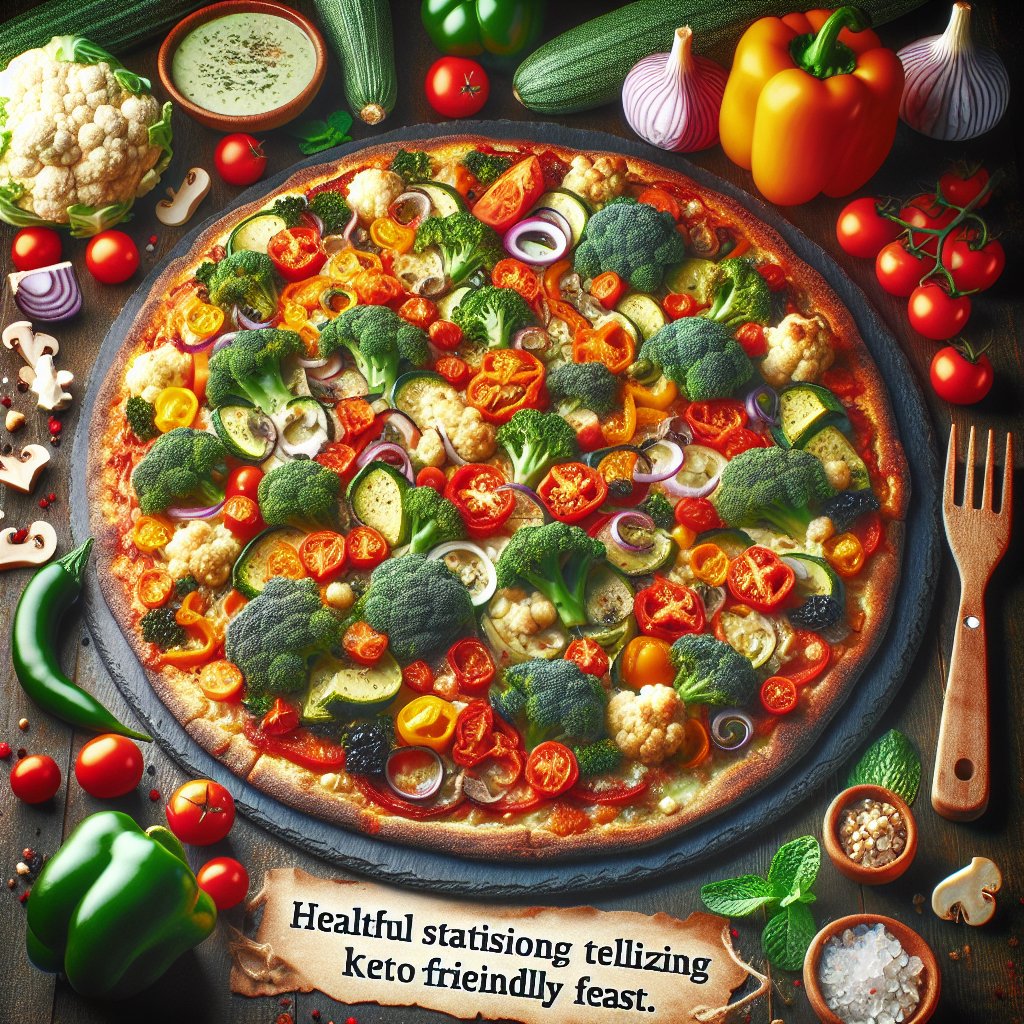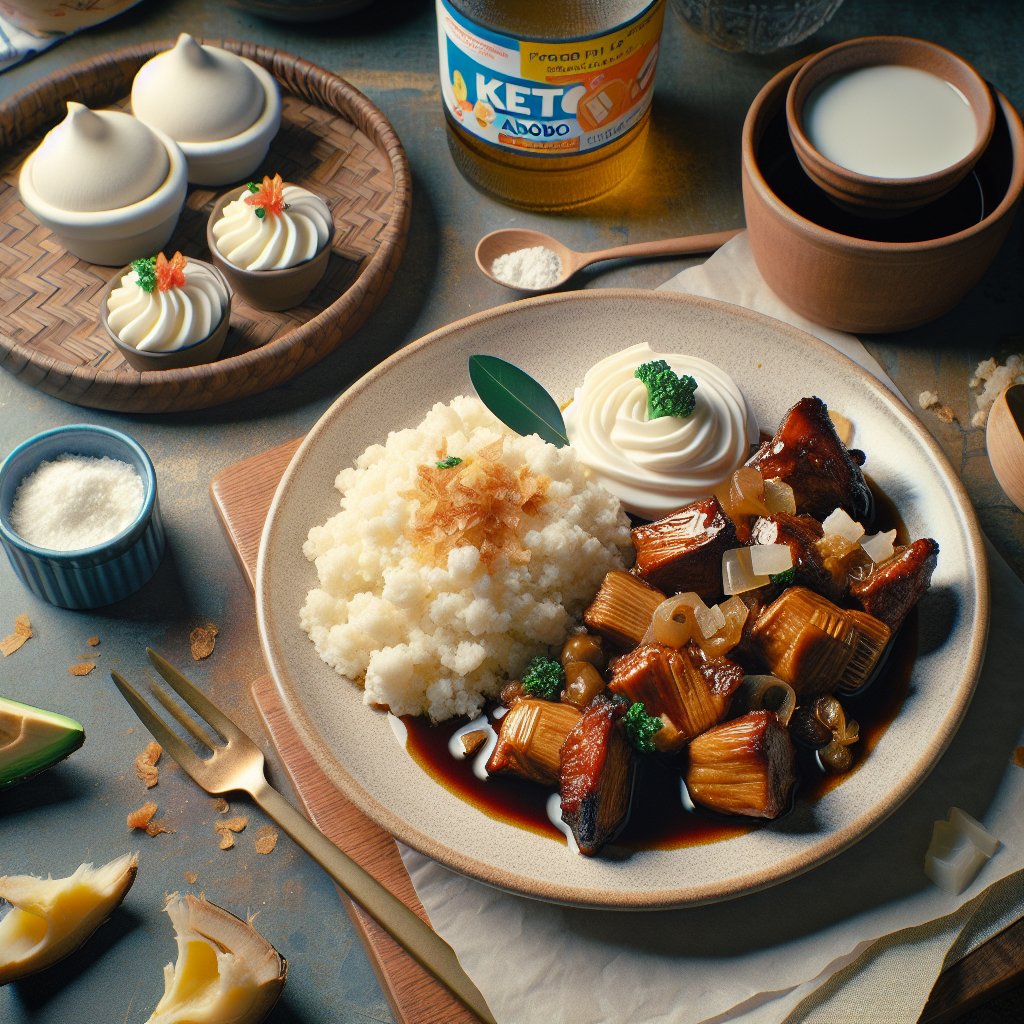Delicious Vegan Cauliflower Pizza Crust Recipe for Keto Diet – Health Benefits, Tips, and Serving Suggestions Revealed!
Introducing the Ultimate Vegan Cauliflower Pizza Crust Recipe for Your Keto Diet
Are you ready to indulge in a delicious pizza while staying loyal to your keto lifestyle? Look no further – because we’re about to dive into the world of vegan cauliflower pizza crust! This healthy alternative to traditional pizza crust has been taking the keto community by storm, and for all the right reasons.
Not only is it a fantastic low-carb option, but it’s also an excellent way to sneak in some extra veggies into your diet. Plus, the taste is truly unbeatable. So, whether you’re a full-fledged vegan, a dedicated keto enthusiast, or simply someone curious about exploring new flavors, this vegan cauliflower pizza crust recipe is a game-changer.

Delicious Vegan Cauliflower Pizza Crust Recipe for Keto Diet – Health Benefits, Tips, and Serving Suggestions Revealed!
Health Benefits of Vegan Cauliflower Pizza Crust on Keto Diet
Are you craving pizza but want to stick to your keto diet? Look no further than a vegan cauliflower pizza crust! This versatile and delicious alternative offers a plethora of health benefits for those following a low-carb, high-fat lifestyle. Let’s dive into the reasons why you’ll want to swap your traditional pizza crust for this keto-friendly option.
Low-Carb and Keto-Friendly
One of the primary health benefits of using cauliflower as a base for a pizza crust is its low-carb content. According to a study published in the International Journal of Food Sciences and Nutrition, cauliflower is an excellent source of fiber and vitamins, while also being extremely low in carbohydrates. This makes it an ideal choice for individuals looking to minimize their carb intake while following a keto diet.
Research has shown that consuming a low-carb diet can lead to improvements in weight management and metabolic health. By using cauliflower as the foundation of your pizza crust, you can indulge in a satisfying meal without compromising your dietary goals.
Gluten-Free Alternative
For individuals with gluten sensitivities or those following a gluten-free diet, cauliflower pizza crust offers a fantastic alternative. A study in the Journal of Nutrition and Metabolism suggests that a gluten-free diet can have numerous health benefits, including improved digestive health and reduced inflammation.
Cauliflower provides a gluten-free base without sacrificing taste or texture, allowing you to enjoy a satisfying slice of pizza without any adverse effects on your health. Whether you have celiac disease or simply prefer to avoid gluten, opting for a cauliflower pizza crust aligns perfectly with your dietary needs.
Nutrient-Dense Option
Another notable health benefit of using cauliflower for your pizza crust is its nutrient density. Cauliflower is packed with essential vitamins, minerals, and antioxidants. According to a review in the Journal of Food Science and Technology, cauliflower contains high levels of vitamin C, vitamin K, and various phytonutrients that support overall health and well-being.
By incorporating cauliflower into your pizza crust, you’re adding an extra dose of nutrition to your meal. This nutrient-rich option not only satisfies your pizza cravings but also contributes to your daily intake of essential nutrients, supporting your overall health on a keto diet.
Now that we’ve uncovered the incredible health benefits of using cauliflower as the base for a vegan keto pizza crust, let’s dive into some practical tips for creating and enjoying this delicious alternative.

Nutritional Value of Cauliflower in Keto Diet
When it comes to the ketogenic diet, finding versatile and nutritious ingredients is essential. Cauliflower is a superstar in the keto community, thanks to its outstanding nutritional profile and its ability to adapt to various recipes, such as the vegan cauliflower pizza crust. Let’s delve into the exceptional nutritional value of cauliflower that makes it perfect for a keto lifestyle.
Vitamins in Cauliflower
Cauliflower is rich in essential vitamins that support overall health and well-being. It’s particularly high in vitamin C, an important antioxidant that helps protect cells from damage and boosts the immune system. Research published in the journal Nutrients suggests that adequate vitamin C intake is linked to a reduced risk of chronic diseases, making cauliflower a valuable addition to the keto diet (source).
Minerals in Cauliflower
From a mineral standpoint, cauliflower offers a good dose of folate, a B vitamin that plays a crucial role in cell growth and metabolism. Furthermore, it contains choline, a nutrient that is essential for liver function and brain development. According to a study in the American Journal of Clinical Nutrition, choline intake is associated with improved cognitive function and reduced inflammation, emphasizing the importance of including cauliflower in a keto diet (source).
Fiber Content
Another standout feature of cauliflower is its impressive fiber content. Fiber is a key component of a ketogenic diet as it aids in digestion, promotes satiety, and helps regulate blood sugar levels. According to research in the journal Nutrients, increasing fiber intake is associated with better weight management and improved overall metabolic health, making cauliflower an excellent choice for those following a keto lifestyle (source).

Delicious Vegan Cauliflower Pizza Crust Recipe for Keto Diet
Section 3: Vegan Cauliflower Pizza Crust Recipe for Keto
Are you ready to try a delicious and keto-friendly twist on pizza night? This vegan cauliflower pizza crust is a game-changer, allowing you to indulge in a guilt-free slice packed with nutrients and flavor. Let’s dive into the step-by-step guide on how to make this mouthwatering pizza crust that will leave you craving for more.
Ingredients:
- 1 medium-sized head of cauliflower
- 1/2 cup almond flour
- 2 tbsp nutritional yeast
- 1 tsp garlic powder
- 1 tsp onion powder
- 1/2 tsp dried oregano
- 1/2 tsp salt
- 1/4 tsp black pepper
- 1 flax egg (1 tbsp ground flaxseed mixed with 3 tbsp water)
- Cooking spray or parchment paper
Instructions:
-
Prepare the Cauliflower: Preheat your oven to 400°F (200°C). Wash the cauliflower and cut it into florets. Place the florets into a food processor and pulse until they resemble a fine, rice-like texture.
-
Cook the Cauliflower: Transfer the riced cauliflower to a microwave-safe bowl and cover it. Microwave for 5 minutes to soften the cauliflower. Let it cool for a few minutes before handling.
-
Squeeze out the Moisture: Once the cauliflower has cooled, place it in a clean kitchen towel or cheesecloth. Squeeze out as much moisture as possible. This step is crucial to achieving a crispy crust.
-
Mix the Crust Ingredients: In a large mixing bowl, combine the squeezed cauliflower, almond flour, nutritional yeast, garlic powder, onion powder, oregano, salt, pepper, and the flax egg. Mix the ingredients until they form a dough-like consistency.
-
Form the Crust: Line a baking sheet with parchment paper or lightly coat it with cooking spray. Place the cauliflower dough on the sheet and use your hands to press it into a thin, round crust of your desired thickness.
-
Bake the Crust: Bake the crust in the preheated oven for 25-30 minutes or until it turns golden brown and firm.
Once your cauliflower pizza crust is ready, it’s time to add your favorite toppings and bake it once more until the toppings are perfectly cooked. This keto-friendly crust provides a hearty and satisfying base for all your favorite pizza combinations.
By using cauliflower instead of traditional flour, you’re incorporating a nutrient-dense vegetable that is rich in vitamins, minerals, and antioxidants. Cauliflower is also low in calories and carbohydrates, making it an excellent choice for those following a ketogenic diet.
Pair your vegan cauliflower pizza crust with colorful and fiber-rich veggies like bell peppers, spinach, and olives for added nutritional benefits. These toppings not only enhance the visual appeal of your pizza but also contribute to your daily fiber intake, supporting gut health and digestion.
The almond flour in this recipe adds a healthy dose of plant-based fats and protein, which can help keep you feeling full and satisfied. Additionally, the inclusion of nutritional yeast provides a savory, cheese-like flavor while offering a source of B vitamins, making this pizza crust not only delicious but also nutritious.
Whether you’re a seasoned keto enthusiast or simply looking to incorporate more plant-based options into your diet, this vegan cauliflower pizza crust is a versatile and mouthwatering choice that is sure to impress your taste buds while aligning with your health and wellness goals. So, grab your apron and get ready to create a pizza masterpiece that’s as good for your body as it is for your palate!

Tips for Perfecting Vegan Cauliflower Pizza Crust
When it comes to crafting the perfect cauliflower pizza crust, there are a few key tips and tricks that can elevate your culinary experience. Not only does a well-executed cauliflower pizza crust fit perfectly into a ketogenic diet, but it also offers a flavorful and satisfying base for your favorite toppings. Here are some useful tips to ensure that your pizza crust turns out crispy, flavorful, and holds well together:
1. Properly Drain the Cauliflower Rice
Before using cauliflower rice to make the crust, it’s crucial to ensure that you eliminate as much moisture as possible. Excess moisture in the cauliflower can lead to a soggy crust, which is the opposite of what we’re aiming for. Research has shown that properly draining the cauliflower rice by using a clean kitchen towel or cheesecloth can significantly improve the texture of the crust, making it crispier and more enjoyable to eat.
2. Use Almond Flour for Binding
Almond flour not only adds a delicious nutty flavor to the crust but also acts as a binding agent, helping the cauliflower rice stick together. Studies have indicated that almond flour is a great low-carb alternative to regular flour and brings a desirable texture to the crust, making it sturdy and less likely to crumble. It also contributes to the overall nutritional profile, providing healthy fats and additional protein.
3. Bake the Crust Twice
For that perfect crispy texture, consider baking the cauliflower crust not once, but twice. After initially baking the crust with the toppings, studies have shown that placing it back in the oven directly on the rack for a few extra minutes can help remove excess moisture, resulting in a sturdier and crunchier crust that holds up well, even with ample toppings.
4. Add Psyllium Husk for Improved Texture
Recent research has shown that incorporating psyllium husk into the cauliflower crust can significantly enhance its texture, making it more bread-like and easier to pick up and hold. Psyllium husk acts as a binding agent and provides a chewy, dough-like consistency, helping the crust maintain its shape while adding a boost of dietary fiber to your pizza.
By implementing these tips, you can ensure a delightful and satisfying cauliflower pizza crust that ticks all the boxes – crispy, flavorful, and with a perfect texture to hold your favorite toppings.

Serving Suggestions and Pairings
Now that you’ve mastered the art of making a delicious vegan cauliflower pizza crust, it’s time to explore the wonderful world of toppings, sauces, and plant-based ingredients that complement the crust perfectly. Whether you’re following a keto diet or simply looking for healthier alternatives, these serving suggestions and pairings will take your cauliflower pizza to the next level.
1. Keto-Friendly Toppings
One of the best parts of enjoying a pizza is the toppings, and with a vegan cauliflower crust, you have the perfect canvas to get creative with keto-friendly options. Research has shown that incorporating healthy fats and nutrient-dense ingredients can support a ketogenic lifestyle. Consider adding toppings such as:
- Avocado slices
- Grilled artichokes
- Spinach and arugula
- Sautéed mushrooms
- Sugar-free marinara sauce
- Red onions
These toppings not only enhance the flavor but also provide essential nutrients and healthy fats, making your pizza both delicious and keto-friendly.
2. Flavorful Sauces
The sauce can make or break a pizza, and when it comes to your vegan cauliflower crust, there are plenty of keto-friendly options to elevate the taste. Studies have shown that incorporating high-quality, low-carb sauces can contribute to a successful ketogenic diet. Consider using the following sauces:
- Pesto made with olive oil and pine nuts
- Alfredo sauce with dairy-free cream and garlic
- Homemade sugar-free barbecue sauce
- Olive tapenade
- Dairy-free creamy garlic sauce
These sauces add depth and richness to your pizza without compromising your keto goals, providing a burst of flavor with every bite.
3. Plant-Based Ingredients
Incorporating a variety of plant-based ingredients not only adds vibrant colors and textures to your pizza but also increases its nutritional value. Research has demonstrated that a plant-based diet can have numerous health benefits, including weight management and improved heart health. Consider including these plant-based ingredients:
- Roasted bell peppers
- Cherry tomatoes
- Chopped kale or Swiss chard
- Broccoli or cauliflower florets
- Caramelized onions
- Sliced olives
By incorporating a variety of plant-based ingredients, you not only enhance the visual appeal of your pizza but also provide your body with essential vitamins, minerals, and fiber to support overall well-being.
4. Perfect Pairings
Pairing your vegan cauliflower pizza with the right accompaniments can elevate the entire dining experience. Whether you’re hosting a gathering or simply enjoying a cozy evening in, these keto-friendly pairings are sure to impress:
- Fresh mixed green salad with a lemon vinaigrette
- Zucchini noodles with dairy-free pesto
- Grilled vegetables drizzled with balsamic glaze
- Cauliflower rice pilaf with herbs and toasted nuts
- Sugar-free berry and coconut cream parfait for dessert
These pairings not only complement the flavors of the cauliflower pizza but also provide a well-rounded, satisfying meal that aligns with your keto lifestyle.
By exploring a variety of toppings, sauces, and plant-based ingredients, as well as learning about perfect pairings, you can create a diverse and exciting culinary experience while staying true to your vegan keto lifestyle. So, grab your apron, preheat the oven, and let your creativity flow as you craft the perfect vegan cauliflower pizza with a keto twist!

FAQs: Vegan Cauliflower Pizza Crust on a Keto Diet
1. Can I Store Vegan Cauliflower Pizza Crust?
Yes, you can definitely store your vegan cauliflower pizza crust. After baking the crust, allow it to cool completely. Once cooled, wrap it tightly in plastic wrap or store it in an airtight container. Properly stored, the crust can be refrigerated for up to 3-4 days. For longer storage, you can freeze the crust. Wrap it securely in plastic wrap and then aluminum foil to prevent freezer burn. It can be frozen for up to 1-2 months. When ready to use, simply thaw the crust in the refrigerator before reheating it.
2. How Can I Reheat Vegan Cauliflower Pizza Crust?
Reheating your vegan cauliflower pizza crust is easy and ensures that it stays delicious. If the crust is frozen, allow it to thaw in the refrigerator overnight. Once thawed, you can reheat it in the oven at 375°F (190°C) for about 10-12 minutes or until it’s crispy and heated through. If you prefer, you can also reheat the crust in a preheated skillet on the stovetop over medium heat. Simply place the crust in the skillet and warm it for 5-7 minutes, flipping it halfway through. This method will give you a slightly crispy crust with a delightful texture.
3. What Customization Options Can I Use with Vegan Cauliflower Pizza Crust?
One of the best things about using a vegan cauliflower pizza crust is that it offers a canvas for endless customization options. You can top your pizza with a variety of low-carb and keto-friendly ingredients such as sugar-free pizza sauce or marinara, dairy-free cheese, colorful bell peppers, leafy greens, mushrooms, cherry tomatoes, and even plant-based protein sources like tofu or tempeh. Get creative with herbs and spices like oregano, basil, garlic powder, and crushed red pepper flakes for added flavor. The possibilities are truly endless, allowing you to tailor your pizza to your personal taste preferences while staying true to your keto diet.
4. Can I Make Mini Vegan Cauliflower Pizza Crusts?
Absolutely! Making mini vegan cauliflower pizza crusts is a fantastic idea, especially if you’re looking for portion control or wanting to serve individual pizzas. To create mini crusts, simply portion the cauliflower crust dough into smaller rounds before baking. You can also use muffin tins or small individual pizza pans to shape the crusts. The baking time may be slightly shorter for mini crusts, so keep an eye on them to ensure they achieve a golden brown color and crispy texture. Once baked, top your mini crusts with your favorite keto-friendly toppings and enjoy your personalized mini pizzas!
5. How Can I Ensure My Vegan Cauliflower Pizza Crust Holds Together?
To ensure that your vegan cauliflower pizza crust holds together, it’s important to properly prepare the cauliflower rice. After pulsing the cauliflower florets in a food processor, it’s crucial to squeeze out as much moisture as possible. Use a clean kitchen towel or cheesecloth to firmly press the cauliflower, removing excess water. This step is essential in preventing a soggy crust and achieving a sturdy base for your pizza. Additionally, when mixing the cauliflower with the other ingredients to form the dough, make sure to thoroughly combine everything for a cohesive mixture that will hold its shape during baking.
6. Are Vegan Cauliflower Pizza Crusts Keto-Friendly?
Absolutely! Vegan cauliflower pizza crusts are incredibly keto-friendly. They offer a low-carb alternative to traditional wheat-based pizza crusts, making them an excellent choice for individuals following a ketogenic diet. Cauliflower is naturally low in carbohydrates and high in fiber, which aligns with the principles of the keto diet. By using cauliflower as the base for your pizza crust, you can enjoy a satisfyingly crispy and flavorful crust while keeping your carb intake in check. Additionally, the customization options for keto-friendly toppings allow you to create a delicious pizza that fits perfectly into your keto lifestyle. With its nutrient-packed profile and versatility, the vegan cauliflower pizza crust is a winning addition to any keto meal plan.

Delicious Vegan Cauliflower Pizza Crust Recipe for Keto Diet – Health Benefits, Tips, and Serving Suggestions Revealed!
Introduction: Embracing the Best of Both Worlds
Are you ready to embark on a delicious culinary journey that seamlessly blends the wholesome goodness of vegan cuisine with the incredible health benefits of the ketogenic diet? In this article, we’re diving into the world of vegan cauliflower pizza crust and unlocking a treasure trove of health benefits, practical tips, and irresistible serving suggestions. Get ready to discover a game-changing recipe that will tantalize your taste buds and nourish your body, all while staying true to the principles of the keto lifestyle.
The Rise of Vegan Cauliflower Pizza Crust: A Nutritional Powerhouse
Imagine a world where you can indulge in the mouthwatering satisfaction of pizza without compromising your commitment to a healthy, low-carb diet. Thanks to the growing popularity of vegan cauliflower pizza crust, this culinary utopia is now a reality. Cauliflower serves as the star ingredient, offering a wealth of essential nutrients and health-boosting properties. Studies have shown that cauliflower is rich in vitamins, minerals, and antioxidants, making it a fantastic addition to any diet, especially for those following a ketogenic lifestyle.
The Benefits of Cauliflower for Keto
Research has demonstrated that cauliflower is low in carbohydrates and high in fiber, making it an ideal choice for those seeking to maintain ketosis. Its versatility and ability to mimic the texture of traditional pizza crust make it an invaluable ingredient for keto-friendly recipes. Additionally, cauliflower contains compounds with anti-inflammatory and immune-boosting effects, further enhancing its appeal for individuals prioritizing their well-being through dietary choices.
The Vegan Cauliflower Pizza Crust Recipe: A Culinary Masterpiece
Now, let’s delve into the heart of this article—the delectable vegan cauliflower pizza crust recipe that will revolutionize your approach to keto-friendly dining. With just a handful of simple ingredients and easy-to-follow steps, you can elevate your homemade pizza experience, creating a wholesome masterpiece that embodies the essence of both vegan and ketogenic principles.
Ingredients You’ll Need
To embark on this culinary adventure, gather the following ingredients:
- 1 head of cauliflower, grated or blended into a fine texture
- Flaxseeds or almond flour
- Nutritional yeast
- Herbs and spices of your choice
- Olive oil
- Salt and pepper
Step-by-Step Preparation
Begin by preheating your oven and lining a baking sheet with parchment paper. Next, combine the grated or blended cauliflower with your chosen binding ingredient, nutritional yeast, herbs, and a splash of olive oil. Season with salt and pepper to taste, then shape the mixture into a round pizza crust on the prepared baking sheet. Bake until golden and crisp, ready to be adorned with your favorite keto-friendly toppings. That’s it—prepare to be amazed by the satisfying crunch and delightful flavor of your homemade vegan cauliflower pizza crust!
Serving Suggestions: Elevating Your Culinary Creations
Now that you’ve mastered the art of crafting a perfect vegan cauliflower pizza crust, it’s time to explore the endless possibilities for topping and enjoying your culinary creation. Whether you prefer classic margherita toppings, an array of fresh vegetables, or even a creative blend of plant-based proteins, the versatility of this recipe knows no bounds.
Keto-Approved Toppings
Opt for toppings such as:
- Fresh tomato slices
- Spinach and kale
- Grilled artichokes
- Plant-based cheese
- Avocado
- Grilled tofu or tempeh
Pairing with Keto-Friendly Companions
Complete your meal with a refreshing side salad drizzled with a delightful vinaigrette, or indulge in a rich, creamy keto-friendly soup. The possibilities are endless, allowing you to savor a complete, well-rounded meal that aligns with your dietary goals.
Summarize the Key Points Discussed in the Article and Reiterate the Benefits of Incorporating Vegan Cauliflower Pizza Crust into a Keto Lifestyle
As we bring this culinary journey to a close, let’s recap the remarkable benefits of incorporating vegan cauliflower pizza crust into your keto lifestyle. By embracing this innovative recipe, you gain access to a nutrient-dense, low-carb alternative to traditional pizza crusts. The abundance of vitamins, minerals, and antioxidants present in cauliflower not only supports overall health but also aligns seamlessly with the principles of the ketogenic diet.
Moreover, research has highlighted cauliflower’s ability to promote satiety, making it a valuable asset for individuals aiming to manage their weight and improve their metabolic health. Its anti-inflammatory properties further contribute to a holistic approach to well-being, marking it as a stellar choice for those seeking a wholesome, health-conscious lifestyle.
By choosing a vegan cauliflower pizza crust, you’re not just indulging in a culinary delight—you’re embracing a harmonious fusion of nutrition, flavor, and dietary alignment. It’s a testament to the boundless creativity and adaptability of the ketogenic lifestyle, demonstrating that you can enjoy your favorite dishes without compromise. So go ahead, invite cauliflower crust pizza into your culinary repertoire and savor the incomparable rewards of this truly exceptional culinary creation!

Delicious Vegan Cauliflower Pizza Crust Recipe for Keto Diet
Servings: 4
Preparation time: 40 minutes
Ingredients:
| 1 medium head of cauliflower, cut into florets |
| 1/2 cup almond flour |
| 2 tbsp ground flaxseeds |
| 2 tbsp nutritional yeast |
| 1/2 tsp dried oregano |
| 1/2 tsp garlic powder |
| 1/4 tsp salt |
| 1/4 tsp black pepper |
Instructions:
| 1. Preheat the oven to 400°F (200°C) and line a baking sheet with parchment paper. |
| 2. Pulse the cauliflower florets in a food processor until they resemble rice-like grains. |
| 3. Transfer the riced cauliflower to a microwave-safe bowl and microwave for 5-6 minutes until tender. |
| 4. Allow the cauliflower to cool, then transfer it to a clean kitchen towel and squeeze out as much moisture as possible. |
| 5. In a large bowl, combine the cauliflower, almond flour, ground flaxseeds, nutritional yeast, oregano, garlic powder, salt, and pepper. Mix until a dough forms. |
| 6. Place the dough on the prepared baking sheet and use your hands to press it into a 9-inch round crust, about 1/4 inch thick. |
| 7. Bake the crust in the preheated oven for 25-30 minutes, or until golden brown and firm to the touch. |
| 8. Remove the crust from the oven and add your favorite keto-friendly toppings. |
| 9. Return the pizza to the oven and bake for an additional 10-15 minutes, or until the toppings are heated through and the crust is crisp. |
| 10. Slice the pizza and serve hot. Enjoy your vegan cauliflower pizza crust, keto-friendly and delicious! |
Nutrition facts:
| Calories per serving | 130 |
| Total Fat | 6g |
| Saturated Fat | 0.5g |
| Carbohydrates | 10g |
| Fiber | 5g |
| Protein | 9g |


